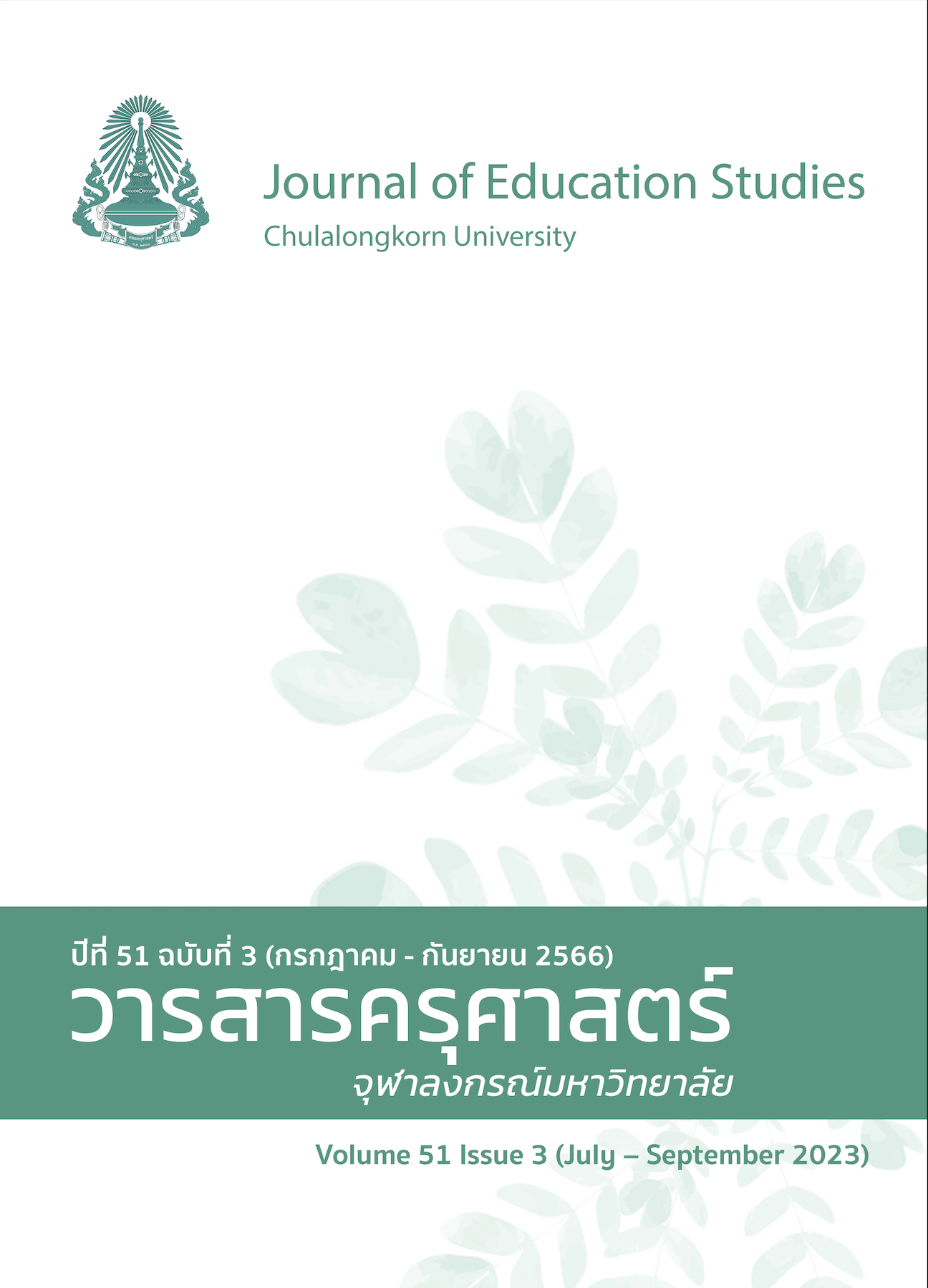ผลของ Game-Based Learning ต่อระดับความยึดมั่นผูกพันและผลสัมฤทธิ์ในการเรียนเมตาบอลิซึมสารชีวโมเลกุลของนักศึกษาพยาบาลชั้นปี 1
DOI:
https://doi.org/10.14456/educu.2023.20คำสำคัญ:
การเรียนการสอนแบบ Game-based Learning, ความยึดมั่นผูกพันในชั้นเรียน, ชีวเคมี, เมตาบอลิซึมสารชีวโมเลกุล, นักศึกษาพยาบาลบทคัดย่อ
เมตาบอลิซึมของสารชีวโมเลกุลเป็นบทเรียนที่เข้าใจยากและซับซ้อน แต่ความเข้าใจเนื้อหานี้มีความจำเป็นอย่างยิ่ง เพราะเป็นความรู้พื้นฐานในการเรียนวิชาทางการพยาบาลอื่นๆ และเป็นผู้เชี่ยวชาญในอนาคต งานวิจัยนี้ใช้ game-based learning เพื่อเพิ่มความยึดมั่นผูกพันและผลสัมฤทธิ์การเรียนของนักศึกษาพยาบาลชั้นปี 1 วิทยาลัยพยาบาลพระปกเกล้า จันทบุรี จำนวน 150 คน โดยใช้แพลตฟอร์มและกิจกรรมเกมที่หลากหลายในการเรียนการสอนเมตาบอลิซึม 4 บท คือ เมตาบอลิซึมคาร์โบไฮเดรต ไขมัน โปรตีน และกรดนิวคลีอิก ซึ่งใช้เวลาสอนบทละ 2 ชั่วโมง เครื่องมือวิจัยใช้แบบวัดระดับความยึดมั่นผูกพันในชั้นเรียน แบบทดสอบความรู้ก่อนและหลังเรียน และข้อสอบปลายภาคบทเมตาบอลิซึม พบว่า 1) game-based learning สามารถเพิ่มความยึดมั่นผูกพันในชั้นเรียนได้อย่างมีนัยสำคัญ (paired t-test; t = -7.062;
p =0.00) 2) คะแนนแบบทดสอบความรู้หลังเรียนสูงขึ้นอย่างมีนัยสำคัญในแต่ละบท และรวมทุกบทหลังใช้ game-based learning 3) คะแนนสอบปลายภาคมีความสัมพันธ์กับระดับความยึดมั่นผูกพันในชั้นเรียนที่เพิ่มขึ้น (Pearson correlation; r = 0.293, p=0.00) ซึ่งสรุปว่า game-based learning เพิ่มระดับความ
ยึดมั่นผูกพันในชั้นเรียน และทำให้ผลสัมฤทธิ์ในการเรียนเมตาบอลิซึมของสารชีวโมเลกุลเพิ่มขึ้น
เอกสารอ้างอิง
จุฬาลักษณ์ พัฒนมาศ และ พิณพนธ์ คงวิจิตต์. (2565). การพัฒนามโนทัศน์หลักการใช้ภาษาไทยและความผูกพันในการเรียนภาษาไทยของนักเรียนชั้นมัธยมศึกษาปีที่ 1 โดยใช้แนวคิดเกมมิฟิเคชั่นร่วมกับเทคนิคเพื่อนช่วยเพื่อน.
วารสารครุศาสตร์ จุฬาลงกรณ์มหาวิทยาลัย, 50(2), 1-13.
ณัฐญา นาคะสันต์ และ ชวณัฐ นาคะสันต์. (2559). เกม : นวัตกรรมเพื่อการศึกษาเชิงสร้างสรรค์. วารสารร่มพฤกษ์ มหาวิทยาลัยเกริก, 34(3), 159-182.
ทิพรัตน์ สิทธิวงศ์. (2564). การศึกษาผลของการใช้บอร์ดเกมเพื่อส่งเสริมการเรียนรู้ สำหรับนิสิตระดับปริญญาตรี คณะศึกษาศาสตร์ มหาวิทยาลัยนเรศวร. วารสารศึกษาศาสตร์ มหาวิทยาลัยนเรศวร, 23(4), 187-200.
นพรัตน์ บุญเพียรผล. (2564). รูปแบบการจัดการเรียนรู้โดยใช้เกมเป็นฐานเพื่อส่งเสริมการเป็นผู้ประกอบการและแนวคิดในด้านการจัดการงานนิทรรศการและงานอีเว้นท์ สำหรับนักศึกษาสาขาวิชาการจัดการงานนิทรรศการงานนิทรรศการและงานอีเว้นท์.วารสารสันติศึกษาปริทรรศน์ มจร, 9(3), 1251-1266.
พรชุลี ลังกา. (2564). ผลของการจัดการเรียนรู้แบบเกมเป็นฐานที่มีต่อผลสัมฤทธิ์ทางการเรียนของนักศึกษารายวิชาปฐมวัย. วารสารวิจัยทางการศึกษา, 16(1), 112-123.
Abdul Jabbar, A. I., & Felicia, P. (2015). Gameplay Engagement and Learning in Game-Based
Learning: A Systematic Review. Review of Educational Research, 85(4), 740–779. https://doi.org/10.3102/0034654315577210
Bartz, A.E. (1999). Basics Statistical Concepts. 4th ed. New Jersey: Prentice Hall.
Crocco, F., Offenholley, K., & Hernandez, C. (2016). A Proof-of-Concept Study of Game-Based Learning in Higher Education. Simulation & Gaming, 47(4), 403–422.
https://doi.org/10.1177/1046878116632484
Cassar, A. G., & Jang, E. E. (2010). Investigating the Effects of a Game-based Approach in Teaching Word Recognition and Spelling to Students with Reading Disabilities and Attention Deficits. Australian Journal of Learning Difficulties, 15(2), 193–211. https://doi.org/10.1080/19404151003796516
Eltahir, Mohd. E., Alsalhi, N. R., Al-Qatawneh, S., AlQudah, H. A., & Jaradat, M. (2021). The impact of game-based learning (GBL) on students’ motivation, engagement and academic performance on an Arabic language grammar course in higher education. Education and Information Technologies, 26(3), 3251–3278. https://doi.org/10.1007/s10639-020-10396-w
Fredricks, J. A., Blumenfeld, P. C., & Paris, A. H. (2004). School Engagement: potential of the Concept, State of the Evidence. Review of Educational Research, 74(1), 59–109. https://doi.org/10.3102/003465430740010
Hendrickson, K. A. (2012). Assessment in Finland: A Scholarly Reflection on One Country’s Use of Formative, Summative, and Evaluative Practices. Mid-Western Educational Researcher, 25, 33–43.
Hilliard, A., & Kargbo, H. F. (2017). Educationally Game-Based Learning Encourages Learners to be Actively Engaged in their Own Learning. International Journal of Education and Practice, 5(4), 45–60. https://doi.org/10.18488/journal.61.2017.54.45.60
Le Hénaff, B., Michinov, N., Le Bohec, O., & Delaval, M. (2015). Social Gaming is InSIDE: Impact of Anonymity and Group Identity on Performance in a Team Game-based Learning Environment. Computers & Education, 82, 84–95. https://doi.org/10.1016/j.compedu.2014.11.002
Lam, S., Jimerson, S., Wong, B. P. H., Kikas, E., Shin, H., Veiga, F. H., Hatzichristou, C., Polychroni, F., Cefai, C., Negovan, V., Stanculescu, E., Yang, H., Liu, Y., Basnett, J., Duck, R., Farrell, P., Nelson, B., & Zollneritsch, J. (2014). Understanding and measuring student engagement in school: The results of an international study from 12 countries. School Psychology Quarterly, 29(2), 213–232. https://doi.org/10.1037/spq0000057
Miller, L. A., & Schmidt, J. R. (2020). The Effects of Online Assignments and Weekly Deadlines on Student Outcomes in a Macroeconomics Course. The American Economist, 66(1), 46-60. https://doi.org/10.1177/0569434520968250
Miralles, L., Garcia-Vazquez, E., & Dopico, E. (2021). Game-based Learning for Engaging Citizens in Biopollution Control. Interdisciplinary Science Reviews, 46(4), 677–688. https://doi.org/10.1080/03080188.2021.1891684
Nunnally, J.D. (1978). Psychometric Theory (2nd ed). New York: McGraw-Hill.
Palma, M. L. M., Santana, A. C., Alves, G. H. V. S. A., Merçon, T., & Castro, H. C. (2018). Nursing and Biochemistry: An Evaluation Strategy Using a Basic Discipline to Present to Freshman Students their Future Professional Environment. Creative Education, 9(3), 497–512. https://doi.org/10.4236/ce.2018.93035
Plass, J. L., Homer, B. D., & Kinzer, C. K. (2015). Foundations of Game-Based Learning. Educational Psychologist, 50(4), 258–283.
https://doi.org/10.1080/00461520.2015.1122533
Rissanen, A. (2018). Student Engagement in Large Classroom: The Effect on Grades, Attendance and Student Experiences in an Undergraduate Biology Course. Canadian Journal of Science, Mathematics and Technology Education, 18(2), 136–153.
https://doi.org/10.1007/s42330-018-0015-2
Terrell, C. R., Nickodem, K., Bates, A., Kersten, C., & Mernitz, H. (2020). Game‐based Activities Targeting Visual Literacy Skills to Increase Understanding of Biomolecule Structure and Function Concepts in Undergraduate Biochemistry. Biochemistry and Molecular Biology Education, 49(1), 94–10. https://doi.org/10.1002/bmb.21398
ดาวน์โหลด
เผยแพร่แล้ว
รูปแบบการอ้างอิง
ฉบับ
ประเภทบทความ
สัญญาอนุญาต

อนุญาตภายใต้เงื่อนไข Creative Commons Attribution-NonCommercial-NoDerivatives 4.0 International License.




